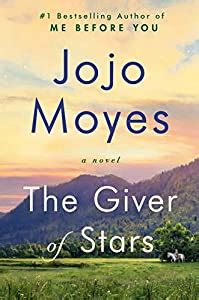Moyes, Jojo. The Giver of Stars. New York: Viking 2019. Print.
Who can resist a title like The Giver of Stars by Jojo Moyes? And those wonderfully descriptive first sentences shown above? And then you find out the plot focuses on library books and the women who deliver them on horseback (actually, muleback) to families buried deep in the woods of Appalachia. Even better, you learn this novel is based on a real-life library system...well, how can you not pick this historical novel up and gobble it down?
Listen.
Three miles deep in the forest just below Arnott's Ridge, and you're in silence so dense it's like you're wading through it. There's no birdsong past dawn, not even in high summer, and especially not now, with the chill air so thick with moisture that it stills those few leaves clinging gamely to the branches.
Description:
Three miles deep in the forest just below Arnott's Ridge, and you're in silence so dense it's like you're wading through it. There's no birdsong past dawn, not even in high summer, and especially not now, with the chill air so thick with moisture that it stills those few leaves clinging gamely to the branches.
Description:
Who can resist a title like The Giver of Stars by Jojo Moyes? And those wonderfully descriptive first sentences shown above? And then you find out the plot focuses on library books and the women who deliver them on horseback (actually, muleback) to families buried deep in the woods of Appalachia. Even better, you learn this novel is based on a real-life library system...well, how can you not pick this historical novel up and gobble it down?
Alice, an British woman living England in the 1930s, meets and falls in love with Bennett Van Cleve, a wealthy American coal baron. They marry and move to a small town in Kentucky to live with Bennett's father near the coal mines he and Bennett oversee with a cold hand.
As Alice becomes more bored with her subserviant, sequestered life expected by these two men, she decides on a whim to join several women starting a Books by Mule program. Started by Eleanor Roosevelt as part of the Works Progress Administration to provide Depression jobs, this program employed women to deliver library books to poverty-stricken families living deep in the woods of Kentucky hills. (Note: This was an actual program in the 1930s, developed and completely operated by women.)
Alice learns to ride a mule -- her first -- and navigate the twisting, rocky, unmarked trails in all weather, forming friendships with families along the way. Children love the picture and alphabet books she brings, while mothers are grateful for the spare time Alice provides them while she reads to the youngsters.
Bennett and his father naturally do not approve of this occupation, feeling it unsuitable for a woman to leave her home responsibilities to ride off into the wilderness and intermingle with people who are not her status. As their marriage becomes more distant, Alice begins to blossom in her new job. Together with the other women, they organize the library holdings and expand their routes to reach more readers.
And of course, there are complications with other townspeople, her husband, other townswomen, and even some of the backwoods residents. Love relationships enter and leave so naturally throughout the plot.
The writing, like the characters, is wonderfully rugged and beautiful at the same time. And coupled with the local phrases, the atmosphere of the book seems Both delightful and honest.
- That Mack McGuire, he makes my heart flutter like a clean sheet on a long line.
- It's hot enough out here to fry a snake.
Sometimes you just need a good, solid book with admirable characters leading realistic yet challenging and loving lives. The Giver of Gifts is such a book. Highly recommended.
____________________
If this book interests you, be sure to check out:
If this book interests you, be sure to check out:
Doig, Ivan. The Whistling Season.
A Chicago woman in 1909 answers an advertisement for a housekeeper for a widower and his three young sons living in an isolated Montana town. She writes that she "Can't cook, but doesn't bite," and gets the job sight unseen (by both of them). She brings her brother with her on the train and he reluctantly becomes a unique schoolteacher. Simply wonderful, a great read not to be missed. (previously reviewed here)





